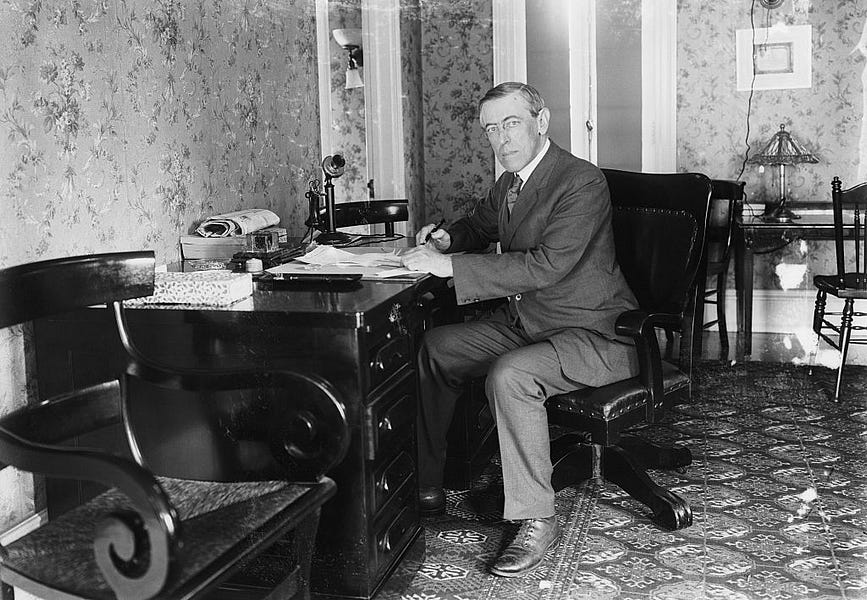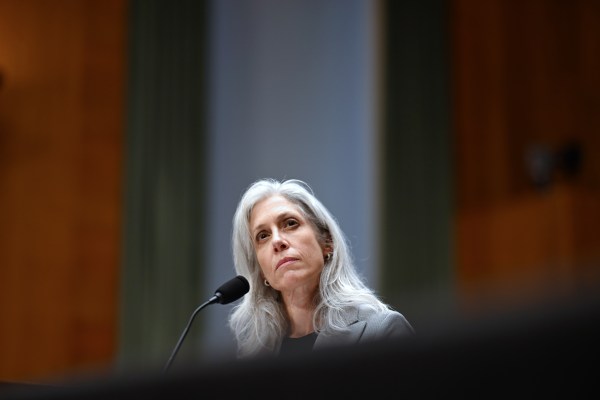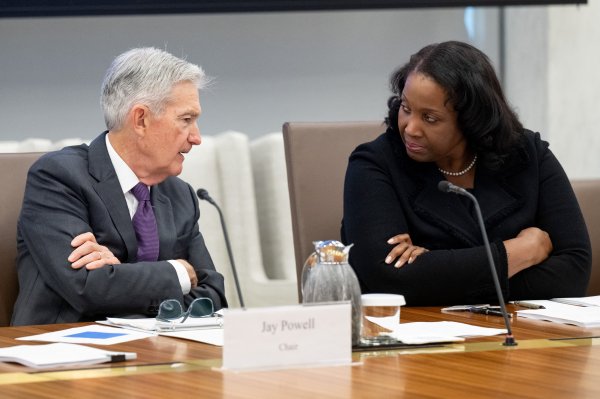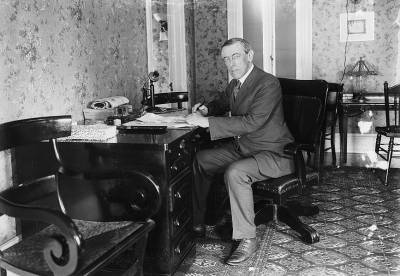Hello—from the past.
This is one of those very rare G-Files that I’m actually writing in advance. Tomorrow—your today—is Yom Kippur, and while I’m not the practicing Jew I should be, and I don’t exactly obey the forms, I also don’t like to flout them publicly. So, I’m writing this in advance and avoiding any political punditry.
There’s a lot of buzz about a new book, American Midnight, by Adam Hochschild. The book is about a period I have a longstanding interest in: America during World War I.
Now, I’ve barely started it—though I have been hunting and pecking through the Kindle version for all sorts of stuff in it already—and I’m sincerely looking forward to finishing it, even though I can already tell I’ll have disagreements. So, I’ll make three points, one fairly petty, one somewhat petty, and one entirely substantive.
The petty.
When the New York Times reviewed Liberal Fascism, the review itself was not exactly a rave, but not exactly a denunciation either. But one thing that always bothered me was the headline, almost surely provided by a Times editor:
“Heil Woodrow!”
That was it. The sarcasm was pretty obvious: What a ridiculous argument this Goldberg fellow is making.
I’ve always thought the headline was an attempt to compensate for the fact that the review was friendlier than the Times wanted. David Oshinsky, a prominent historian, at least implicitly conceded I had a point about Woodrow Wilson. After summarizing—pretty fairly—my indictment of Wilson as a fascistic president during the war, Oshinsky said I was “less convincing” when I turned my sights to Franklin Roosevelt. Well, okay, so I was at least a little convincing prior to that?
But lots of other folks thought I was just being ridiculous about Wilson, who was then still very much an icon of American liberalism. (Believe me, the scorn I received was pretty wild.) More than two years later, the New York Times held a symposium trying to figure out why weirdos like me had such a problem with Wilson. (I completely forgot about it—and my response to it—until today.)
One of the funny responses amounted to whatabouting Teddy Roosevelt: He had some bad ideas, too! There’s a little truth there, I guess, but when Teddy Roosevelt was president, he didn’t round up thousands of political prisoners, or unleash or encourage state-sanctioned terror on the American people. And his “Americanism” wasn’t remotely like Wilson’s full-throated—and very modern—racism. These seem like important distinctions to me.
(I don’t have nearly the space to offer my full indictment against Wilson, but here’s just some of the stuff I’ve written about him in the past. And here’s Dan McGlaughlin’s handy “Hater’s Guide to Woodrow Wilson.”)
Anyway, attitudes about Wilson have changed—a lot—since then. And while I’m proud to say I think I deserve some small amount of credit for it, I think a much bigger driver of the long-overdue liberal reappraisal stems from the changing relationship between contemporary progressivism and the past. After all, in a country where just a couple years ago, mobs were tearing down statues of abolitionists—presumably because of some perceived sin of white supremacy—it shouldn’t be hard to condemn the most racist president of the 20th century, even if he had a D after his name.
My somewhat petty complaint.
So much for my petty gripe. I was right about Wilson, and I was treated shabbily for it.
One reason I was treated shabbily (there were many!) was that because I was a conservative, I simply had to be wrong until progressives came along and said otherwise. Now they’re not saying I was right, but they are saying, “No one knew about this!” And that’s a problem, too.
Even the subtitle of the book plays into this: American Midnight: The Great War, a Violent Peace, and Democracy's Forgotten Crisis. In the opening pages Hochschild leans into this “forgotten” and “overlooked” period.
Here’s how the Boston Globe’s David Shribman opens his essay on the book: “Between the story of the doughboys of World War I and the glittery onset of the Roaring Twenties is a brutal chapter of American history almost always omitted from high-school textbooks and the standard history offerings at the nation's universities.” [Emphasis mine.]
What bugs me about this is how passive it is. Why was it left out of the textbooks and syllabi? When my daughter studied this period in high school, I had to tell her, “This is what they want you to know,” and, “This is what they won’t tell you.” When I recounted the numerous horrors of the Wilson administration, she wanted to know why no one told her about this stuff. It’s a good question!
Yes, a lot of it has to do with “forgetting.” But the forgetting is downstream of erasing. This stuff was left on the cutting room floor because it didn’t fit the liberal narrative that dominated the historical profession. Authoritarianism, nativism, hysteria, paranoia, etc. are supposed to be exclusive phenomena of the right. That’s why the “Red Scare” of the McCarthy period gets so much attention, while the first and far worse “Red Scare” of the Wilson period gets comparatively little. And it’s why what Leo Ribuffo called the Brown Scare is ignored almost entirely.
Hochschild writes in the opening pages:
The toxic currents of racism, nativism, Red-baiting, and contempt for the rule of law have long flowed through American life. People of my generation have seen them erupt in McCarthyism, in the rocks and insults hurled at Black children entering previously all-white schools, and in the demagoguery of politicians like Richard Nixon, George Wallace, and Donald Trump. By the time you read this, they may well have boiled up again in additional ways. My hope is that by examining closely an overlooked period in which they engulfed the country, we can understand them more deeply and better defend against them in the future. “The struggle of man against power,” wrote Milan Kundera, “is the struggle of memory against forgetting.”
Again, I agree the period is largely overlooked. But this passage worries me because it sure sounds like Hochschild is trying to shoehorn the Wilson period into the same categories that absolve progressives from their share of the blame. But I’ll withhold final judgment until I read the whole thing.
One last point on this. I don’t claim that I was the first to point out the various atrocities of the Wilson years. I can list a whole bunch of authors who beat me to it—Robert Nisbet, Arthur Ekirch, Randolph Bourne, Richard Gamble, Robert Higgs, and Murray Rothbard are just a few that come to mind. But to one extent or another, all of these people were shunted aside, dismissed as obsessives, cranks, or otherwise inconvenient distractions.
In other words, it’s not that “no one told us,” but that those in charge didn’t want to hear it.
(As a matter of intellectual honesty, I do have to admit one thing on this point. An interesting historiographical and intellectual question I’ve never had satisfactorily answered is why so many post-World War II conservatives started their indictments of American progressivism with the New Deal, when the New Deal was in almost every respect a continuation of Wilson’s war socialism. National Review did have some very sharp rebukes of Wilson in its early years, but often came up shy of offering the full-throated indictment he deserved.)
The bigger picture.
And that leads me to my broader point, which is a bit of a repeat of something I wrote last month. As Austin Powers might say, allow myself to repeat myself:
… And that’s just nonsense as a historical matter, unless, of course, you subscribe to the view that whenever liberals do something bad they cease to be liberals. This is the view of Michael Tomasky. I often chuckle at his claim, made in a pathetic review of my first book, that whenever American liberalism “crosses the line into coercion, well, that is where liberals—I mean liberals who know something about liberalism—get off the train, and do their noncoercive best to derail it.”
If this were true, one would think that when FDR rounded up Japanese Americans and put them in internment camps, he ceased to be liberal and the history books would be full of tales of “real” liberals resigning en masse from the Roosevelt administration. I must have missed it when Oliver Wendell Holmes authorized the forced sterilization of “unfit” women in Buck v. Bell and all those liberals jumped ship. We all recall when every liberal who knew anything about liberalism recognized the coercion in busing or forcing nuns to buy birth control and did their best to stop it. And who can forget how that baker who didn’t want to bake a cake for a gay wedding was defended by every informed and sincere liberal. Don’t even get me started on Woodrow Wilson.
Americans—particularly Americans unhealthily engaged in politics—are polarized for many reasons. But one of them is that the conservative movement rose as a kind of antibody response to the official narrative of liberalism.
The most obvious form of that narrative is media bias. Don’t worry: I’m not going down that rabbit hole. I only bring it up because that old saying “journalism is the first draft of history” has more depth than the self-serving cliché peddlers realize. If journalism is the first draft of history, history is the foundation journalism builds upon. In short: Journalists come out of a tradition, an intellectual milieu, and that frames how they cover things.
Let me give you a small, but important, example of what I’m getting at. I honestly don’t know if it was always the case, but certainly for more than a century, American journalists have considered the White House the most important beat in their profession. Now, I think that’s utterly defensible as an objective observation. It is the most important job in the sense no one talks about being promoted from, say, chief White House correspondent to a chief congressional correspondent, never mind—shudder—chief U.N. correspondent. The only gig considered bigger is to be an anchor of some kind, and by then the lesson is already deeply ingrained. The White House is the center of the political and journalistic universe.
Again, there are good practical arguments for this. But think about all of the ideological assumptions built into the arrangement. Let’s start with the fact that one of the main reasons the president gets so much attention is that it’s easier to focus on one person who supposedly “runs” the country. TV journalism loves to reduce political contests to personality contests, and presidents suit that compulsion perfectly. One could even argue that the aggregation of legislative power in the speaker’s office is also a byproduct of this tendency.
But the idea that the president “runs” the country is really an ideological assertion that has become so widely accepted—because the press has pretended it’s true for so long—that we don’t even think of it as ideological.
For instance, you know what obscure document says the president isn’t in charge? The Constitution of the United States. Congress is the first branch of government and, as I am wont to rant about, it is vastly more powerful than the presidency (on paper). A plain reading of the Constitution says that Congress declares wars, not the president. Congress can fire members of the executive and judicial branch, while neither of those branches can do likewise to Congress. The Founders cared a good deal about the power to tax—you could look it up by googling “the American Revolution.” Well, only Congress can levy taxes. Congress creates all of the courts save for the Supreme Court. It sets the salaries of the president, his Cabinet, the military, and all the judges and justices, too. Congress also writes these things called “laws,” which until recently, everyone understood was the sole prerogative of the legislature.
This isn’t some airy fairy point fit only for a poli sci seminar. Politico began a piece about Ron DeSantis’ alleged hypocrisy thus:
Gov. Ron DeSantis has been a persistent critic of President Joe Biden on nearly every policy front as he moves toward a likely potential 2024 presidential bid. But the Florida Republican likes one thing about the president: his wallet.
The president doesn’t have a wallet! I mean, Joe Biden does. It probably even has a notecard in it to remind him of his Cabinet secretaries’ names. But the president doesn’t have his own kitty of shmundo to spend as he likes without congressional authorization. But to read coverage of Biden’s lawless bid to forgive billions in student loan debt, you’d think many of the best and brightest journalists in America believe otherwise. It’s almost like political journalists want the president to be a king, because if he’s a king then their jobs are much more important.
If you just looked at the freshly written Constitution in 1789, you might be forgiven for thinking that the best beat in journalism was Congress—because that’s where all the power was supposed to be. It hasn’t worked out that way. And the press, the TV press in particular, are partly to blame. But so are the presidents—especially Wilson and Roosevelt, but also every president that followed.
And so are the historians. Now, “the historians” is admittedly a broad category, and I’m obviously doing a disservice to a great many of them. But from Wilson forward, for all manner of complicated and mutually reinforcing reasons—technology, the Cold War, laziness, the rise of the administrative state, etc.—the presidency has benefitted from a kind of secular idolatry (to borrow a term from Kevin Williamson). Liberal historians were aiders and abettors of that cult of the presidency.
Anyway, I didn’t mean to get sidelined by a fairly narrow complaint about the imperial presidency. The broader point is that everyone owns American history and the sins of America’s past aren’t purely the responsibility of the other team. Hochschild is right about those “toxic currents” in American history. And he’s certainly correct that those currents have erupted from what could be called the right at various times, including today. But the fons et origo of those toxic currents isn’t the right. The headwaters of such toxicity are the human heart, and they can flow in any ideological direction. It’s fine to debate whether Wilson was of the “left”—there were certainly many people further to his left back then, and he put many in jail—but his vision of government and power was not the American conservative’s or libertarian’s vision. Whatever label you want to put on that vision, it was sufficiently shared by historians, journalists, Democrats, and progressives generally that they found it necessary to keep what he did out of the official narrative.
I agree entirely with Milan Kundera that “The struggle of man against power, is the struggle of memory against forgetting.” But it’s a bit annoying that we had to wait so long for it to be considered acceptable—even courageous—to remind people of what happened on Wilson’s watch and by his hand.







Please note that we at The Dispatch hold ourselves, our work, and our commenters to a higher standard than other places on the internet. We welcome comments that foster genuine debate or discussion—including comments critical of us or our work—but responses that include ad hominem attacks on fellow Dispatch members or are intended to stoke fear and anger may be moderated.
With your membership, you only have the ability to comment on The Morning Dispatch articles. Consider upgrading to join the conversation everywhere.